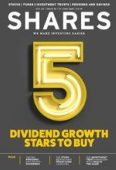Archived article
Please note that tax, investment, pension and ISA rules can change and the information and any views contained in this article may now be inaccurate.
Space the new frontier for investors as ETF and investment trust launch

The addition to the London market of an investment trust and an exchange-traded fund which invest in companies involved in space activities reflect the theme’s move into the mainstream.
Seraphim Space Investment Trust is hoping to raise £150 million to launch the world’s first listed fund investing in the space sector. This comes after the Procure Space ETF (YODA) joined the London Stock Exchange at the start of June.

While sending passengers into space has caught the public’s imagination, it’s the ongoing commercialisation of the sector that’s interesting investors.
The cost of building satellites, which are becoming increasingly lighter and smaller, and sending them into orbit has reduced dramatically in recent years, opening up a wide range of potential commercial applications.
The difference between the space-focused investment trust and the ETF is that the trust will invest in unlisted companies, while the ETF only holds listed stocks.
The trust will raise £150 million in new investor money and incorporate assets in Seraphim’s existing fund, worth £100 million. It has invested half the money in 20 space-related firms, with many valued at more than $1 billion.
Two of its portfolio companies are planning stock market floats in the US by merging with SPACs. Spire Global, a provider of satellite-based global weather forecasting and analytics, and Arqit, a UK-based quantum computing encryption company, will be valued at $1.4 billion apiece if their US floats go ahead. The trust is targeting an eye-catching annual return of 20%.
BESPOKE SPACE INDEX
Meanwhile the Procure Space ETF, which tracks a bespoke index, only invests in companies that are listed on the stock market, with 80% of the index made up of stocks that derive over 50% of their revenue from space-related businesses.
To be included in the index a firm must have a market value of more than $100 million and the ability for the shares to be easily bought and sold with at least $1 million traded in its shares each day.
Since inception in April 2019, the US-listed version of the ETF is up 22.8% which lags behind a 39.7% rise for the MSCI World index over the same time period. The ongoing charge of 0.75% is quite high for an ETF but reflects the specialised nature of the vehicle.
One well-known investor in space-related stocks is Baillie Gifford-run investment trust Scottish Mortgage (SMT).
Speaking in an investor update in April, co-manager Tom Slater highlighted unquoted SpaceX, created by Tesla founder Elon Musk, and said that as the cost per kilogram of cargo into space gets lower and lower, it opens up ‘huge new applications’.
He added: ‘One of the first is telecommunications, so moving away from having mobile phone masts to having communications access to doing that from satellites. We think there’s all sorts of applications that this enables.’
Important information:
These articles are provided by Shares magazine which is published by AJ Bell Media, a part of AJ Bell. Shares is not written by AJ Bell.
Shares is provided for your general information and use and is not a personal recommendation to invest. It is not intended to be relied upon by you in making or not making any investment decisions. The investments referred to in these articles will not be suitable for all investors. If in doubt please seek appropriate independent financial advice.
Investors acting on the information in these articles do so at their own risk and AJ Bell Media and its staff do not accept liability for losses suffered by investors as a result of their investment decisions.
Issue contents
Case study
Great Ideas
- SkinBio Therapeutics' psoriasis supplement could be a real money spinner
- BlackRock Throgmorton shoots the lights out amid mid-cap momentum
- Change at the top to supercharge Brown Advisory US Smaller Companies
- Why Lindsell Train loves Diageo as much as we do
- Aurora Investment Trust moves into top gear thanks to value tailwind
- Inditex's sales and earnings growth defy the doubters
Investment Trusts
Money Matters
News
- Record job additions not sparking inflation fears yet
- Markets unmoved by lockdown easing delay
- Space the new frontier for investors as ETF and investment trust launch
- GlaxoSmithKline to spin-off £30 billion consumer healthcare arm in 2022
- Regulator tells companies to prioritise pensions over dividends

 magazine
magazine








